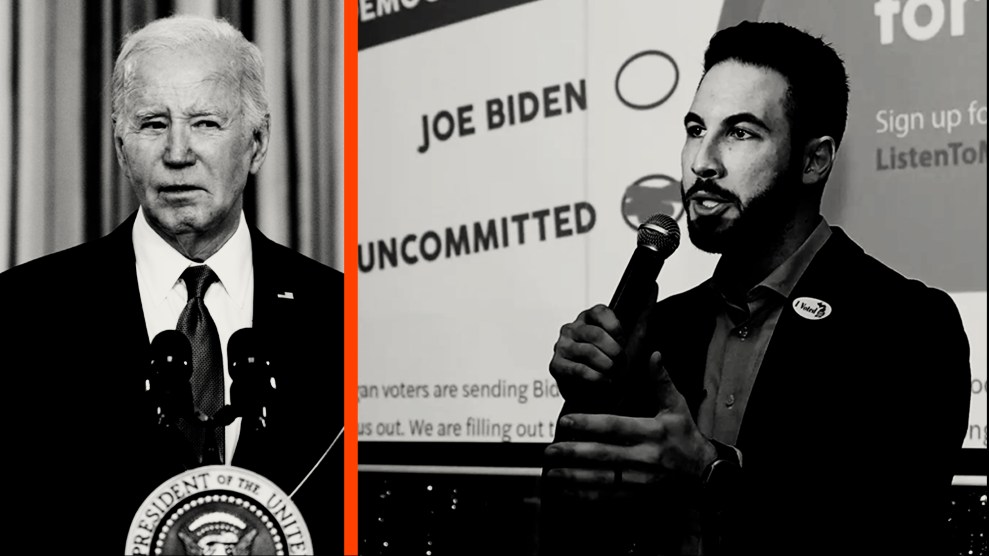
President Joe Biden (left) and Dearborn's Democratic Mayor Abdullah Hammoud. Hammoud, who backed the uncommitted campaign, speaks during an election night gathering on Tuesday in Dearborn.Yuri Gripas/Pool/CNP/ZUMA; Carlos Osorio/AP
In 2012, voters in Michigan’s Democratic primary had two choices: Barack Obama and uncommitted. In Dearborn, the first city in the United States with an Arab American majority, 87 percent voted for Obama, while 13 percent went uncommitted. In this year’s primary, which was held Tuesday amid protests of Joe Biden’s response to the war in Gaza, 40 percent of Dearborn voters backed Biden and 57 percent voted uncommitted—44 points more than in 2012.
The fact that uncommitted won a majority in Dearborn—while receiving 13 percent statewide, compared to 81 percent for Biden—is all the more powerful because the grassroots effort to vote uncommitted, led by groups like Listen to Michigan, began only a few weeks ago. If anything, the results in Dearborn may understate the degree of disgust with Biden among Arab American and Muslim voters: About 55 percent of Dearborn residents are of Middle Eastern or North African descent; the initial vote counts, which likely included a higher vote share of Arab American voters, had as much as 74 percent of people choosing uncommitted.
Meanwhile, there were clear signs around college campuses that—as polls have shown for months—Biden is similarly losing support among young voters. In many precincts in Ann Arbor, home to the University of Michigan, more than 20 percent of people went uncommitted, while in some the share voting uncommitted approached or exceeded 40 percent. (Overall, 17 percent of voters in Washtenaw County, which includes Ann Arbor, went uncommitted.)
The uncommitted campaign is a response to the reality facing Palestinians in Gaza, some of whom have relatives in Dearborn. Roughly 30,000 Palestinians—mostly women and children—have been killed during Israel’s war on Gaza, according to the local health ministry. A senior UN humanitarian official said this week, “If nothing is done, we fear widespread famine in Gaza is almost inevitable and the conflict will have many more victims.” The International Court of Justice concluded that South Africa has a plausible case that Israel’s actions constitute genocide.
Israel has fought the war with strong support from Biden and the United States, which has supplied the bombs and UN vetoes needed to keep the war going. That has led many Arab Americans and young people to reconsider their support for the president. As Dearborn’s Democratic mayor, Abdullah Hammoud, wrote in a New York Times op-ed last week that backed voting uncommitted:
What compounds the constant fear and mourning is a visceral sense of betrayal. In the past three federal elections, Arab American voters in Michigan have become a crucial and dependable voting bloc for the Democratic Party, and we were part of the wave that delivered for Joe Biden four years ago. But this fact seems long forgotten by our candidate as he calls for our votes once more while at the same time selling the very bombs that Benjamin Netanyahu’s military is dropping on our family and friends.
As expected, the picture statewide was more mixed. Overall, more than 100,000 people voted uncommitted. Some commentators have pointed out that that is not all that different from the 11 percent who voted uncommitted statewide in 2012. But there are significant differences between the two elections.
In 2012, the Obama campaign was actively discouraging its supporters from voting in the primary since delegates were actually awarded via the state’s caucus. Partly as a result of that, turnout was unusually low. Fewer than 200,000 people voted in the 2012 Democratic primary, compared to more than 1.2 million in 2016 and 2020, and more than 750,000 this year.
In all three primaries from 2012 to 2020, between 19,000 and 22,000 people voted uncommitted. Having more than 100,000 Michiganders choose uncommitted is a major shift and a significant problem for Biden’s reelection effort, especially when considering that Donald Trump edged out Hillary Clinton by less than 11,000 votes in Michigan in 2016, while Biden beat Trump there by about 150,000 votes—a less than 3 point margin—in 2020. Polls now consistently show Trump leading Biden in the state.
The results in Michigan are another sign the president’s team underestimated the level of outrage that its war response would provoke. The New York Times‘ Peter Baker reported Tuesday that the president’s advisers had been hoping the war would end in early January—and that they thought Arab Americans and people on the left would calm down as they saw Gaza being rebuilt over the summer. This, like so many of their predictions about the war and their ability to shape its direction, is proving to be wishful thinking.
It remains unclear how people who voted uncommitted Tuesday will end up voting—if they vote at all—if faced with a choice between Biden and Trump in the general election. But Democrats would be foolish not to take people like Terry Ahwal, a Palestinian American living in Michigan who was a longtime Democratic voter, at her word when she says she is not going to vote for Biden, absent major changes in US policy. “You want my vote? You cannot kill my people in my name,” Ahwal recently told the New York Times. “As simple as that.”
















